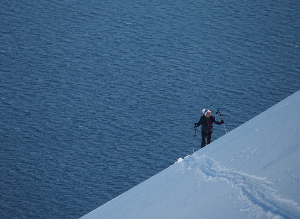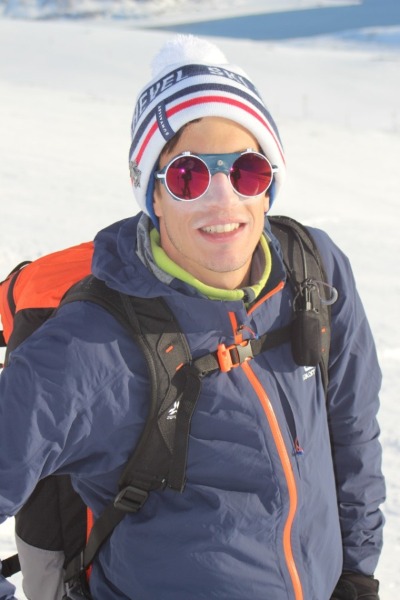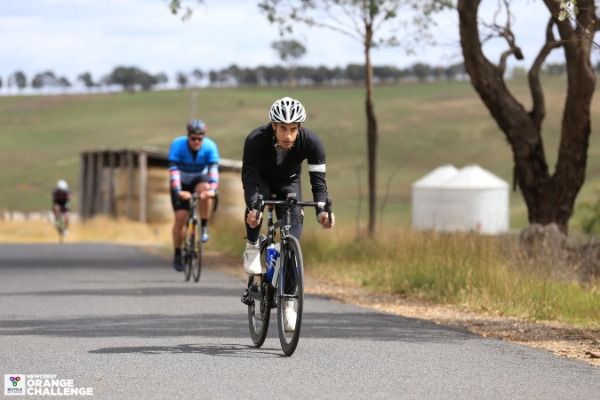Nicolas' story: Pursuing athletic dreams despite MS
Published 10 May 2019 • By Louise Bollecker
An outstanding triathlete, one of our French members, Nicolas Campos was 27 years old when multiple sclerosis was diagnosed. Despite the illness, he decided to pursue his passions and presents his daily life and his next sporting challenges.

Hello Nicolas, can you introduce yourself?
Born in 1988 and a lifelong sportsman, I started by getting seriously involved in football in the post-France 1998 craze. Alpine skiing remains one of my favourite sports.
After a master's degree in a business school in Paris, I went to work in Australia to enjoy the great outdoors and an exceptional quality of life for athletes. I then discovered triathlon, which quickly became my way of life.
My MS started when I am 27 years old, and despite the symptoms of the disease on a daily basis, I try to tame it as best I can to pursue my passions.

What were your first symptoms of multiple sclerosis?
The first symptoms of my MS were paresthesias, which then progressed to ankle spasticity and walking difficulties. Incontinence, fatigue, etc. were also added.
Was it a long diagnosis?
The most frustrating phase of the disease was the lack of an initial diagnosis. Even before I met the first neurologists and had the first MRIs, I had "self-diagnosed". My opinion was based on internet research, but also on discussions with doctor friends. When I arrived at the hospital (for the second time, after going to the emergency room for the first time and being diagnosed with a herniated disc), I was told that I was only a victim of myelitis, and despite the 3 days of corticosteroid boluses prescribed to me, I did not have an official diagnosis. So no background treatment.
How did you react to the announcement of the diagnosis?
6 months later, after the appearance of new lesions on cerebral and spinal cord MRI, the diagnosis was given to me as a release; a key that will allow me to access disease-modifying treatments. I had hope they would help me to control the symptoms of this disease. So I had no difficulty accepting the diagnosis.
I had already made progress in managing the disease before. First of all, by learning as much as I can about multiple sclerosis: by reading scientific books and publications, and by avoiding trusting catastrophist testimonials and opinions. A person's opinion at any given time cannot be an objective reflection of the disease. I focused on all the factors I could control: starting to adapt my diet, changing my lifestyle, focusing on things that were good for me rather than things that just gave me pleasure.
How did you accept the disease? Was it natural to continue doing sport?
When I was diagnosed, I decided to take some time to do a retreat. It was a unique opportunity to reflect on myself, my aspirations, my life and how the diagnosis could help me redefine what I wanted to become. I think this episode was a key step for me in accepting the disease. The objective for me was really to get the most out of it, to understand how I could use the diagnosis to improve my living conditions.
"When I have problems with my ankle, I can ride a bike or swim. When my arms don't respond, I can go running."
In this process of my retreat and self-reflection, I had come up with the idea that I would no longer do sport. The first symptoms of MS were particularly difficult, and I wanted to focus on protecting my body. But nature quickly regained the upper hand. One day, I went to the pool and swam 500 meters. When I got to the end, I said to myself: my body still works. It was a huge relief.
How does the disease impact your daily life as an athlete?
I gradually resumed training, trying to listen to my body as much as possible. Sport allows me to escape, to think completely about something else. When I run, when I swim, when I'm on my bike, I feel fully alive, and that's the most important thing. Sport does not reduce symptoms, but does not allow you to think about them. My condition is variable and I adapt to the symptoms of MS.
How do you feel about your next sporting challenges?
After getting back into training, I was able to become competitive again, and participate in long-distance triathlons (1.9km swimming, 90km cycling and 21km running). With the world championships being held in France in 2019, I have set myself the goal of qualifying. I worked with a coach to structure my training, and to keep MS in a real place, that is, to think about the unexpected. Respect your body and fatigue. With 6 months of intensive training and no major upsurges to regret, my race in China scheduled for April 2018 went very well, and my ranking allowed me to validate my ticket for the world championships that will take place in September 2019.

How did you adapt the other aspects of your daily life to MS?
My daily life has been disrupted by MS. Or rather, thanks to MS. Or rather, my MS was a trigger that made me aware of all the beneficial changes I could make to my environment.
After reading the scientific literature and some French and international books on the management of MS (Overcoming Multiple Sclerosis by Julien Venesson, Overcoming Multiple Sclerosis by P. Jelinak), I started to get into yoga, sophrology and meditation. Sleep has taken a crucial place in the organization of my days. I try to adapt my diet by eating as many home-cooked meals as possible and avoiding prepared meals. All these changes have gradually taken place in my life, I did not choose to radically change my lifestyle. I also chose to change jobs by looking for a job where I could put my quality of life ahead of work. I left the stressful and demanding world of strategy consulting to join a large company where I informed my direct superiors of my health problems.
What has been the role of your loved ones in these life changes?
My relatives were very understanding and supportive. I think it is essential to know how to surround yourself, because the disease can be a burden to manage alone on a daily basis. I am fortunate to have a very patient and supportive girlfriend. She has also been able to adapt her lifestyle to the changes I need to make. My parents are obviously very worried, but I insist with them on the ever more effective management of the disease. I keep them informed of MRI results and neurologist visits.
"I don't want pity from others, I need understanding"
With people I know less, I try not to talk about the disease. Only 4 people know about it at the office. The less I talk about it, the less people talk to me about it, and the better I feel. I don't want pity from others; I need understanding. Others must be able to understand my fatigue, my nervousness, my difficulties. To do this, my girlfriend wrote a 2-page clear and explanatory document on MS, talking a lot about invisible symptoms. She then sent this document to most of my close friends and family. This allowed them to understand and not ask absurd or incessant questions.
You have chosen to publicise your illness, particularly through a portrait in The Team, can you tell us more about it?
Mediatising the disease was a very difficult choice, as it requires regular communication about symptoms, fear of the unknown and future challenges that may arise. The advantage is that it makes it possible to make the disease known and to destroy a certain number of myths surrounding multiple sclerosis: disability is not automatic, SEPs are not condemned, hope exists! You have to choose life, and that's the message I'm trying to send.
What is your treatment today? Have you been included in the care team's choice of this treatment?
The choice of treatment was particularly surprising. The neurologists let me choose my medication, unfortunately with very little information. I had a choice between Aubagio, Copaxone and interferons.
>> Evaluate your treatment by clicking here
I made a comparison table of each of these drugs on different criteria (efficacy, side effects, dosage, etc.) by looking for information on the internet and talking to patients. I found some existing comparison tables, and I built my own. I then asked my neurologists a few questions of clarification before making a decision.
I chose Aubagio because it is easy to take and the side effects are limited. My only reservations concerned the potential risk of foetal malformation in the event of parenthood and the lack of progress on the drug, launched on the French market in 2014. I have been on Aubagio for more than 2 years now, I have a good support for the drug and it is relatively effective.
Many thanks to Nicolas for sharing his story and advice to adapt his daily life to the disease without giving up his passions!
Don't forget to comment on this testimonial to provide your support and ask your questions.

 Facebook
Facebook Twitter
Twitter





